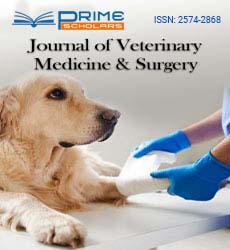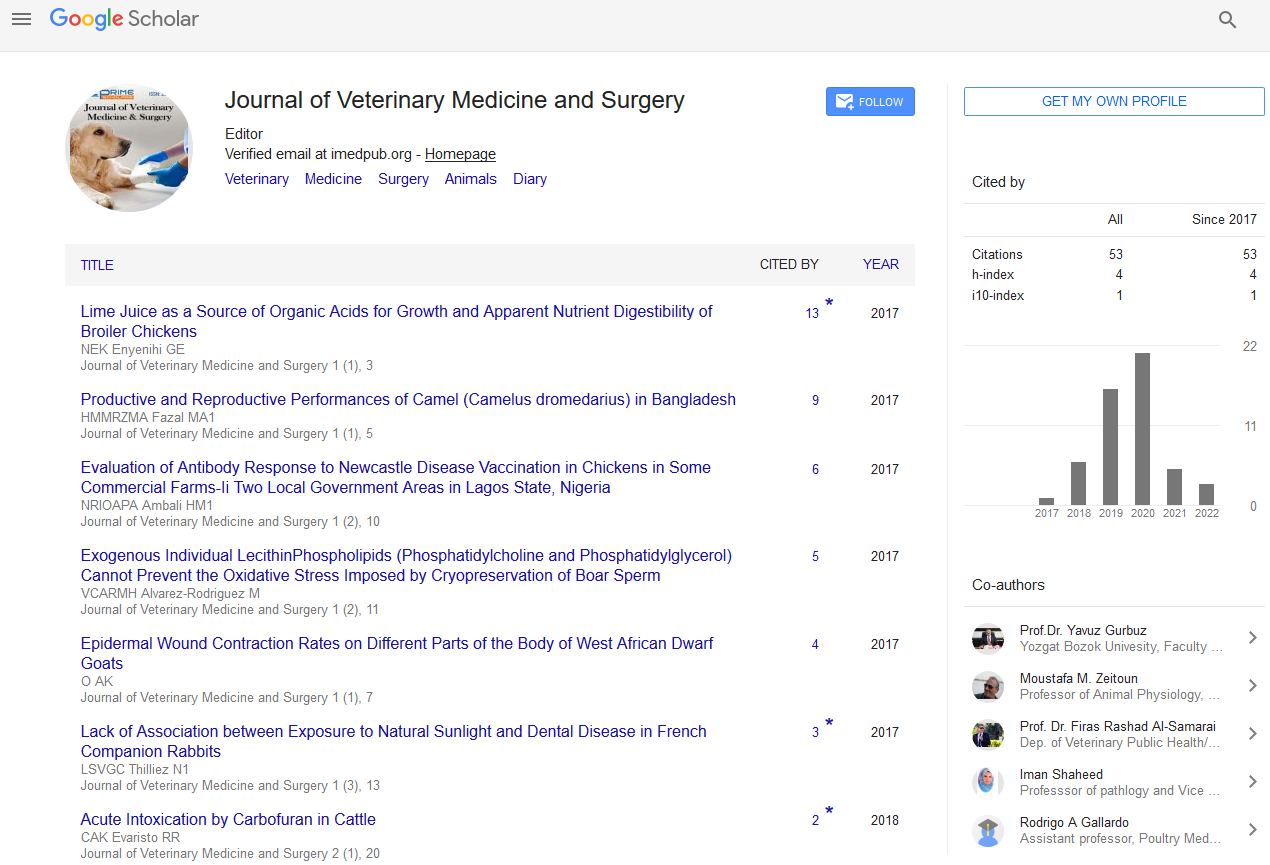Commentary - (2024) Volume 8, Issue 3
Veterinary Etiology: Understanding the Causes of Animal Diseases
Andrew Taylor*
Department of Veterinary Sciences, Duke University, USA
*Correspondence:
Andrew Taylor,
Department of Veterinary Sciences, Duke University,
USA,
Email:
Received: 02-Sep-2024, Manuscript No. IPJVMS-24-21924;
Editor assigned: 04-Sep-2024, Pre QC No. IPJVMS-24-21924 (PQ);
Reviewed: 18-Sep-2024, QC No. IPJVMS-24-21924;
Revised: 23-Sep-2024, Manuscript No. IPJVMS-24-21924 (PQ);
Published:
30-Sep-2024, DOI: 10.36648/2574-2868.8.3.23
Description
Veterinary etiology is the branch of veterinary medicine that focuses on the study of the causes of diseases in animals. This field is crucial for understanding the origins and mechanisms behind various animal health problems, from infectious diseases to genetic disorders and environmental stressors. By identifying the etiology of diseases, veterinarians can better diagnose, prevent, and treat illnesses, ultimately improving animal health and welfare. Etiology, in a medical context, refers to the study of the causes or origins of diseases. In veterinary medicine, etiology is essential because it helps practitioners determine what is causing a particular illness or condition in animals. The term encompasses a wide range of factors that can lead to disease, including pathogens (like bacteria, viruses, fungi, and parasites), genetic mutations, environmental influences, and even nutritional imbalances. Understanding the etiology of a disease is key to effective treatment and prevention. If a disease is caused by an infectious agent like a virus or bacterium, veterinarians can use vaccines, antibiotics, or other medications to treat or prevent the illness. If the cause is genetic, early detection through screening can help manage or prevent the condition. Environmental or lifestyle factors, such as poor diet or exposure to toxins, may be managed through better animal care and living conditions. Infectious diseases are caused by pathogens such as bacteria, viruses, fungi, and parasites. These microorganisms invade an animal’s body, leading to disease. Like canine parvovirus or feline leukemia virus, both of which can have severe health impacts. Environmental factors play a significant role in the health of animals, and diseases can arise from factors such as toxins, pollutants, extreme weather, and poor living conditions. Correctly identifying the etiology of an animal’s illness is essential for effective treatment. For instance, bacterial infections are treated with antibiotics, while viral infections require antiviral therapies or supportive care, such as fluids or rest. The success of treatments like vaccinations or parasite control programs depends on understanding the specific pathogens involved. Moreover, understanding the cause of a disease allows veterinarians to implement prevention strategies. For example, knowing that a specific parasite, like Dirofilaria immitis (heartworm), causes heart disease in dogs enables veterinarians to recommend preventive medications to protect animals from the disease. Additionally, knowledge of genetic diseases helps in breeding programs aimed at reducing the prevalence of hereditary disorders in animal populations. By identifying and screening for genetic conditions, breeders can avoid producing animals that are at risk for these diseases. Veterinary etiology is a vital field that contributes to improving animal health by identifying the root causes of diseases. Whether the disease is caused by an infectious agent, genetic factor, environmental influence, or trauma, understanding its etiology is the first step in providing effective treatment and prevention. This knowledge empowers veterinarians to diagnose diseases more accurately, administer targeted therapies, and educate pet owners and livestock managers on ways to reduce risk factors. With continued advancements in veterinary science and technology, the field of etiology will play an increasingly important role in enhancing the health and well-being of animals worldwide.
Acknowledgement
None.
Conflict Of Interest
None.
Citation: Taylor A (2024) Veterinary Etiology: Understanding the Causes of Animal Diseases. J Veterinary Med. 8:23.
Copyright: © 2024 Taylor A. This is an open-access article distributed under the terms of the Creative Commons Attribution License, which permits unrestricted use, distribution and reproduction in any medium, provided the original author and source are credited.

